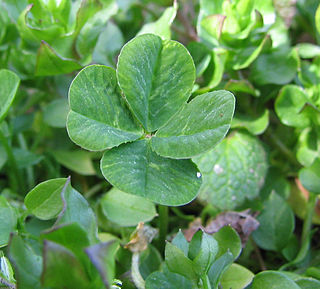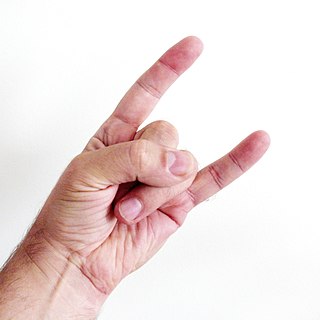
Luck is the phenomenon and belief that defines the experience of improbable events, especially improbably positive or negative ones. The naturalistic interpretation is that positive and negative events may happen at any time, both due to random and non-random natural and artificial processes, and that even improbable events can happen by random chance. In this view, the epithet "lucky" or "unlucky" is a descriptive label that refers to an event's positivity, negativity, or improbability.

The evil eye is a supernatural belief in a curse brought about by a malevolent glare, usually inspired by envy. The belief in the evil eye among humans has existed since prehistory, and amulets to protect against it have been found dating to about 5,000 years ago. It is estimated that around 40% of the world's population believes in the evil eye.
Theatrical superstitions are superstitions particular to actors or the theatre.

The sign of the horns is a hand gesture with a variety of meanings and uses in various cultures. It is formed by extending the index and little fingers while holding the middle and ring fingers down with the thumb.
"Rabbit rabbit rabbit" is a superstition found in Britain and North America wherein a person says or repeats the words "rabbit", "rabbits" and/or "white rabbits" aloud upon waking on the first day of a month, to ensure good luck for the rest of it.

Apotropaic magic or protective magic is a type of magic intended to turn away harm or evil influences, as in deflecting misfortune or averting the evil eye. Apotropaic observances may also be practiced out of superstition or out of tradition, as in good luck charms, amulets, or gestures such as crossed fingers or knocking on wood. Many different objects and charms were used for protection throughout history.
"Break a leg" is a typical English idiom used in the context of theatre or other performing arts to wish a performer "good luck". An ironic or non-literal saying of uncertain origin, "break a leg" is commonly said to actors and musicians before they go on stage to perform or before an audition. Though the term likely originates in German, the English expression is first attributed in the 1930s or possibly 1920s, originally documented without specifically theatrical associations. Among professional dancers, the traditional saying is not "break a leg", but the French word merde.
"Bread and butter" is a superstitious blessing or charm, typically said by young couples or friends walking together when they are forced to separate by an obstacle, such as a pole or another person. By saying the phrase, the bad luck of letting something come between them is thought to be averted. Both walkers must say the phrase, and if they do not do this, then a bitter quarrel is expected to occur. The concept derives from the difficulty of separating butter from bread once it has been spread – buttered bread cannot be "unbuttered". Another phrase used in this way is "salt and pepper".

Russian traditions and superstitions include superstitions and folk rituals of the Russian community. Many of these traditions are staples of everyday life, and some are even considered common social etiquette despite being rooted in superstition. The influence of these traditions and superstitions vary, and their perceived importance depends on factors such as region and age.

A touch piece is a coin or medal believed to cure disease, bring good luck, influence people's behaviour, carry out a specific practical action, etc.

The hamsa, also known as the hand ofFatima, is a palm-shaped amulet popular throughout North Africa and in the Middle East and commonly used in jewellery and wall hangings. Depicting the open hand, an image recognized and used as a sign of protection in many times throughout history, the hamsa has been traditionally believed to provide defense against the evil eye.

"One for Sorrow" is a traditional children's nursery rhyme about magpies. According to an old superstition, the number of magpies seen tells if one will have bad or good luck.

A superstition in Western cultures holds that spilling salt is an evil omen. However, salt has had a variety of meanings in religions around the world.
Sailors' superstitions are superstitions particular to sailors or mariners, and which traditionally have been common around the world. Some of these beliefs are popular superstitions, while others are better described as traditions, stories, folklore, tropes, myths, or legend.
Superstition in Pakistan is widespread and many adverse events are attributed to the supernatural effect. Superstition is a belief in supernatural causality: that one event leads to the cause of another without any physical process linking the two events, such as astrology, omens, witchcraft, etc., that contradicts natural science. In Pakistan, the Magical thinking pervades as many acts and events are attributed to supernatural and ritual, such as prayer, sacrifice, or the observance of a taboo are followed. Many believe that magic is effective psychologically as it has placebo effect to psychosomatic diseases. Scholars of Islam view superstition as shirk, denying the unity of God and against Sharia. Within Islam, shirk is an unforgivable crime; God may forgive any sins if one dies in that state except for committing shirk. Sleeping on your right side and reciting the Ayat-ul-Kursi of the Quran can protect person from the evil.
A necessary evil is an evil that someone believes must be done or accepted because it is necessary to achieve a better outcome—especially because possible alternative courses of action or inaction are expected to be worse. It is the "lesser evil" in the lesser of two evils principle, which maintains that given two bad choices, the one that is least bad is the better choice.
"Toi toi toi" is an expression used in the performing arts to wish an artist success in an imminent performance. It is similar to "break a leg" and reflects a superstition that wishing someone "good luck" is in fact bad luck.
In bocca al lupo is an Italian idiom originally used in opera and theatre to wish a performer good luck prior to a performance.
Turkey is a country full of many traditions, its superstitions not being far behind. The superstitions are believed to be based on myths, legends, fables, traditions, and stories. The exact origins remain unknown, as most of it was passed down orally through folk-tales.
Superstitions have been present in Britain throughout its history. Early modern Britain was a superstitious society, and the superstitions were documented at the time. The belief in witches, the devil, ghosts, apparitions, and magical healing was founded on superstitions. In modern Britain, according to a 2003 survey carried out during the National Science Week and a 2007 poll conducted by Ipsos and Ben Schott of Schott's Almanac, knocking on wood is the most popular superstition in Britain, with "crossing fingers for good luck" coming after it.









